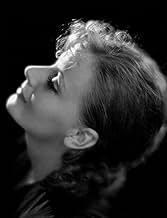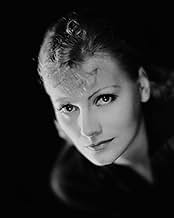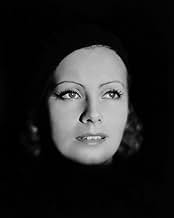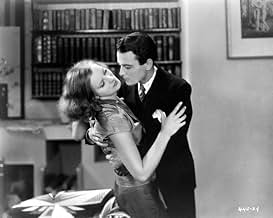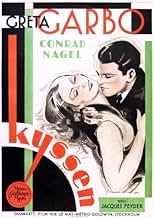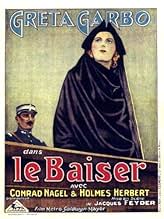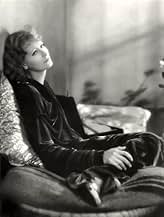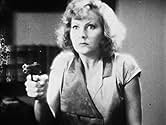VALUTAZIONE IMDb
6,8/10
1300
LA TUA VALUTAZIONE
Aggiungi una trama nella tua linguaAn unhappily married woman is caught up in scandal and murder when her affection toward a young man is misinterpreted.An unhappily married woman is caught up in scandal and murder when her affection toward a young man is misinterpreted.An unhappily married woman is caught up in scandal and murder when her affection toward a young man is misinterpreted.
- Regia
- Sceneggiatura
- Star
Symona Boniface
- Gossip in Museum
- (non citato nei titoli originali)
Allan Cavan
- Prison Warden
- (non citato nei titoli originali)
André Cheron
- Prosecutor
- (non citato nei titoli originali)
Carrie Daumery
- Party Guest
- (non citato nei titoli originali)
Ruth Feldman
- Scrubwoman
- (non citato nei titoli originali)
Lee Phelps
- Tour Guide
- (non citato nei titoli originali)
Philip Sleeman
- Lounge Lizard
- (non citato nei titoli originali)
Recensioni in evidenza
In Lyons, Irene Guarry (Greta Garbo) is not happy with her marriage with the old businessman Charles Guarry (Anders Randolf) and is in love with the young lawyer André Duball (Conrad Nagel). Irene knows that the jealous Charles will never give the divorce to her; therefore they decide to stop seeing each other since she does not want to be an unfaithful wife and defy the convention. André also decides to move to Paris. One day, Irene knows the eighteen year-old college student Pierre Lassalle (Lew Ayres) in a party during his vacation and she learns that the youngster is infatuated with her. By the end of his vacation, Pierre asks a photo for Irene and she promises to give one to him. Meanwhile Charles has a meeting with Pierre's father Lassalle (Holmes Herbert) and discloses that he is on the verge of bankruptcy. Lassalle promises to help his friend and they schedule a meeting in the night. When Charles goes to the encounter, Pierre arrives at his home and asks for a goodbye kiss to Irene. Meanwhile Charles does not feel well and returns home, witnessing their kiss. Charles tries to kill Pierre and later the student arrives home and tells his father that Charles is dead. Irene is arrested accused of murdering her husband. What happened in Charles's office?
"The Kiss" is a melodramatic romance and the last MGM and Greta Garbo's silent film and the debut of Lew Ayres. The movie has beautiful shots, a mystery and Greta Garbor extremely beautiful. Despite being a silent film, MGM uses sound technology with a powerful orchestral soundtrack. My vote is seven.
Title (Brazil): "O Beijo" ("The Kiss")
"The Kiss" is a melodramatic romance and the last MGM and Greta Garbo's silent film and the debut of Lew Ayres. The movie has beautiful shots, a mystery and Greta Garbor extremely beautiful. Despite being a silent film, MGM uses sound technology with a powerful orchestral soundtrack. My vote is seven.
Title (Brazil): "O Beijo" ("The Kiss")
The Kiss (1929) was the final silent film produced by Metro-Goldwyn-Mayer. It was also the final silent film of stars Greta Garbo and Conrad Nagel.
The subtle acting and sophisticated (and purely visual) storytelling show how far silent cinema had come by the late 1920s. When talkies took over Hollywood, the acting regressed back to that of the stage, the background music was replaced with static hiss, and even basic film-making techniques were restrained due to the sound equipment. It would take a few years for sound technology to grow in sophistication.
Removed from its distinction as the end of an era, The Kiss is an average melodrama, especially for Garbo, who plays an unhappily married woman in love with another man. She looks luminous and acts completely with her eyes, her brilliance showing through even in material such as this. Conrad Nagel is competent in an unchallenging role, and Lew Ayres is simultaneously adorable and somewhat sinister as the young man smitten with Garbo.
The big twist is predictable and the recorded score is cheesy, using Tchaikovsky's Romeo and Juliet theme as the lovers' leitmotif, but overall, this is a skillfully made bit of melodramatic fluff, the last gasp of MGM's silent output.
The subtle acting and sophisticated (and purely visual) storytelling show how far silent cinema had come by the late 1920s. When talkies took over Hollywood, the acting regressed back to that of the stage, the background music was replaced with static hiss, and even basic film-making techniques were restrained due to the sound equipment. It would take a few years for sound technology to grow in sophistication.
Removed from its distinction as the end of an era, The Kiss is an average melodrama, especially for Garbo, who plays an unhappily married woman in love with another man. She looks luminous and acts completely with her eyes, her brilliance showing through even in material such as this. Conrad Nagel is competent in an unchallenging role, and Lew Ayres is simultaneously adorable and somewhat sinister as the young man smitten with Garbo.
The big twist is predictable and the recorded score is cheesy, using Tchaikovsky's Romeo and Juliet theme as the lovers' leitmotif, but overall, this is a skillfully made bit of melodramatic fluff, the last gasp of MGM's silent output.
As a fan of Greta Garbo films, I consider each one of them highly entertaining and worth seeking out. The Swedish beauty could captivate the viewer in many of her roles to such extend that she was as popular in movie world as, much later, the Swedish band ABBA was in music world. Yet, when I talk to people who are quite knowledgeable about the early cinema, I usually encounter the opinion that Garbo films let them down. "She was such a dramatic lady," they say "she can still make us cry."
Strange as it may occur, to some extend, this pretentious opinion may be found accurate, particularly when we consider the year 1939 and Garbo's first comedy NINOTCHKA made by Ernst Lubitsch. What a change, what a revelation it was! "A true transformation," some said and indeed, NINOTCHKA proved Garbo's talent in comedy (unfortunately forever bound to fail two years later in TWO FACED WOMAN). But few people know that Garbo had wonderfully modern roles in some other films, roles that can still make your day thanks to their charm and convincing portrayals. One of such films is THE KISS with original musical score, the last silent movie of Garbo and MGM directed by Jacques Feyder with whom Garbo worked later on the German version of "Anna Christie" with Salka Viertel. The uniqueness of THE KISS is the fact that it is very different from all other Garbo films.
The kiss of 'good bye' that cost Irene Guarry (Greta Garbo) so much (which was metaphorically Garbo's farewell to silents) is the representation of all human struggles and desires. Simple as the short story may seem, when you watch the film carefully, you realize that the director aimed at conveying some important and a very up-to-date message for all of us: "Listen to your heart not the tyrants of conventions and misery of duties..." There is a bit of everything in the story: wit, romance, jealousy, pardoning... Consider, for instance, the sequence at the court where we get the masterwork of human situation, individual situation in the mute world.
The film can boast terrific artistic merits with scenes of exceptional charm. Here, a mention must be made of the party at Lasalle, which again proves the glamor of the silent era. But, most things we can appreciate here are there thanks to the Swedish Sphinx... Garbo. The great Greta gives another brilliant performance in the lead but, as it has already been mentioned, her role differs from other of her silent roles in the way that Irene Guarry appears to be a particularly modern character as well as her story appears to be extremely appealing to modern audience. It is not as much her vehicle as the story which captivates certain viewers. That, however, does not mean that we easily forget the great actress whose presence illumines the moments and supplies them with unique power. There are exceptional shots of Garbo's face. Consider, for instance, the moment she looks at herself in the mirror. Perhaps not as great as the ultra famous moment in FLESH AND THE DEVIL but also highly worth attention. What a great beauty she was!
So to speak, THE KISS is a very important movie in both Garbo's career and the history of MGM. It occurs to be a great farewell to the silent era, an interesting look at life situation filled with the affection that any kiss deserves... And for Garbo fans somewhere there in the world: a different look at the famous Swede, yet, unique and magnetic as always.
Strange as it may occur, to some extend, this pretentious opinion may be found accurate, particularly when we consider the year 1939 and Garbo's first comedy NINOTCHKA made by Ernst Lubitsch. What a change, what a revelation it was! "A true transformation," some said and indeed, NINOTCHKA proved Garbo's talent in comedy (unfortunately forever bound to fail two years later in TWO FACED WOMAN). But few people know that Garbo had wonderfully modern roles in some other films, roles that can still make your day thanks to their charm and convincing portrayals. One of such films is THE KISS with original musical score, the last silent movie of Garbo and MGM directed by Jacques Feyder with whom Garbo worked later on the German version of "Anna Christie" with Salka Viertel. The uniqueness of THE KISS is the fact that it is very different from all other Garbo films.
The kiss of 'good bye' that cost Irene Guarry (Greta Garbo) so much (which was metaphorically Garbo's farewell to silents) is the representation of all human struggles and desires. Simple as the short story may seem, when you watch the film carefully, you realize that the director aimed at conveying some important and a very up-to-date message for all of us: "Listen to your heart not the tyrants of conventions and misery of duties..." There is a bit of everything in the story: wit, romance, jealousy, pardoning... Consider, for instance, the sequence at the court where we get the masterwork of human situation, individual situation in the mute world.
The film can boast terrific artistic merits with scenes of exceptional charm. Here, a mention must be made of the party at Lasalle, which again proves the glamor of the silent era. But, most things we can appreciate here are there thanks to the Swedish Sphinx... Garbo. The great Greta gives another brilliant performance in the lead but, as it has already been mentioned, her role differs from other of her silent roles in the way that Irene Guarry appears to be a particularly modern character as well as her story appears to be extremely appealing to modern audience. It is not as much her vehicle as the story which captivates certain viewers. That, however, does not mean that we easily forget the great actress whose presence illumines the moments and supplies them with unique power. There are exceptional shots of Garbo's face. Consider, for instance, the moment she looks at herself in the mirror. Perhaps not as great as the ultra famous moment in FLESH AND THE DEVIL but also highly worth attention. What a great beauty she was!
So to speak, THE KISS is a very important movie in both Garbo's career and the history of MGM. It occurs to be a great farewell to the silent era, an interesting look at life situation filled with the affection that any kiss deserves... And for Garbo fans somewhere there in the world: a different look at the famous Swede, yet, unique and magnetic as always.
"The Kiss" happens about midway into the movie ... Greta Garbo gives young admirer Lew Ayres a friendly kiss goodbye as he's about to leave town, Ayres, who cannot control his infatuation with the beautiful Garbo, goes in for another, less platonic kiss, at which point Garbo's husband sees them from afar and goes berserk. A fight amongst the three ensues, gets carried into another room where the door is shut to us, the audience, and we hear a shot. Garbo's husband is dead, but who did it?
Prior to the "kiss" moment, we've seen Garbo and her lover (Conrad Nagel) in a torturous romance ... they both love each other madly but Greta doesn't see any way out of her loveless marriage. In the meantime, Lew Ayres follows Greta around like a puppy dog; he's an 18-year-old completely infatuated with the beautiful married lady.
The latter half of the movie deals with the investigation of the husband's death, Greta's arrest, and her trial where she is defended by Nagel who in addition to being her former lover is also a lawyer.
I won't give away the outcome of the trial, but I will say that the jury believes it is Person A who did it and after the trial we learn it was Person B.
The musical score to this flick was absolutely horrible. I especially could have done without the "Romeo and Juliet" theme that was played every time the flick wanted to telegraph Greta's and Conrad's love to the audience.
Despite the score, this was a very enjoyable silent movie. I find some silents tedious, others quite well done. "The Kiss" definitely falls into the latter category. Worth watching.
Prior to the "kiss" moment, we've seen Garbo and her lover (Conrad Nagel) in a torturous romance ... they both love each other madly but Greta doesn't see any way out of her loveless marriage. In the meantime, Lew Ayres follows Greta around like a puppy dog; he's an 18-year-old completely infatuated with the beautiful married lady.
The latter half of the movie deals with the investigation of the husband's death, Greta's arrest, and her trial where she is defended by Nagel who in addition to being her former lover is also a lawyer.
I won't give away the outcome of the trial, but I will say that the jury believes it is Person A who did it and after the trial we learn it was Person B.
The musical score to this flick was absolutely horrible. I especially could have done without the "Romeo and Juliet" theme that was played every time the flick wanted to telegraph Greta's and Conrad's love to the audience.
Despite the score, this was a very enjoyable silent movie. I find some silents tedious, others quite well done. "The Kiss" definitely falls into the latter category. Worth watching.
This isn't the best Garbo silent ever made, but it was the last, and it was also the final silent film made by MGM. What makes this film good is the combination of Garbo's acting and the cinematography here. Movies like this and Sunrise make me somewhat sad that the silent film era ended, because what could be done creatively with the camera was lost from this point until the early 30's once the problems of the static camera got worked out and the novelty of sound at the expense of everything else wore off.
Garbo convincingly plays the sympathetic yet no-longer-in-love wife when in the presence of her husband (Anders Randolf), the longing lover who wishes to defy convention and just leave her marriage behind regardless of the consequences when with André Dubail (Conrad Nagel), and the knowledgeable "older" woman who is enjoying the attention she is getting when with the very young and naive Pierre Lassalle (Lew Ayres). Whenever she is alone she has no trouble conveying which of these three moods she is in. The story is a very good tale of tortured romance with a little bit of mystery thrown in towards the end, but the main attractions are the romance and the beautiful and creative shots. The only thing really annoying is the original Vitaphone score that went along with the movie. With all of the other subtle expression going on in this film, the choice of the theme song from "Romeo and Juliet" to convey the feelings between Garbo and Nagel every time they shared a scene just seemed a bit over the top.
Garbo convincingly plays the sympathetic yet no-longer-in-love wife when in the presence of her husband (Anders Randolf), the longing lover who wishes to defy convention and just leave her marriage behind regardless of the consequences when with André Dubail (Conrad Nagel), and the knowledgeable "older" woman who is enjoying the attention she is getting when with the very young and naive Pierre Lassalle (Lew Ayres). Whenever she is alone she has no trouble conveying which of these three moods she is in. The story is a very good tale of tortured romance with a little bit of mystery thrown in towards the end, but the main attractions are the romance and the beautiful and creative shots. The only thing really annoying is the original Vitaphone score that went along with the movie. With all of the other subtle expression going on in this film, the choice of the theme song from "Romeo and Juliet" to convey the feelings between Garbo and Nagel every time they shared a scene just seemed a bit over the top.
Lo sapevi?
- QuizMGM's last non-talking picture.
- BlooperIn the opening credits, the name André, Conrad Nagel's character, is spelled "Ardré."
- Versioni alternativeMGM also released this movie without a soundtrack, as a totally silent film.
- ConnessioniFeatured in MGM Parade: Episodio #1.30 (1956)
I più visti
Accedi per valutare e creare un elenco di titoli salvati per ottenere consigli personalizzati
- How long is The Kiss?Powered by Alexa
Dettagli
Botteghino
- Budget
- 257.000 USD (previsto)
- Tempo di esecuzione1 ora 2 minuti
- Mix di suoni
- Proporzioni
- 1.33 : 1
Contribuisci a questa pagina
Suggerisci una modifica o aggiungi i contenuti mancanti


